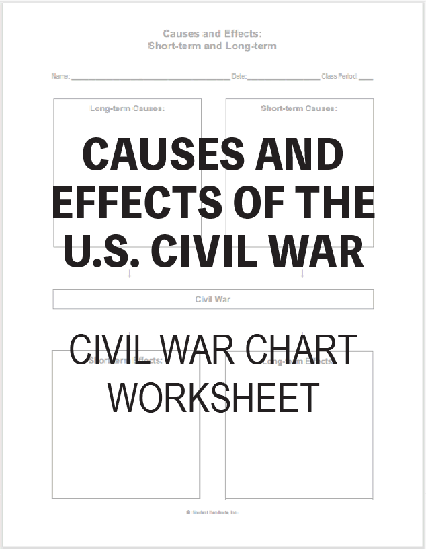For this worksheet, students are asked to chart the long- and short-term causes and effects of the American Civil War (1861-1865).
Click here to print. Answers will vary.
The U.S. Civil War, which took place from 1861 to 1865, had a complex set of causes and far-reaching effects on the United States.
Causes of the U.S. Civil War:
- Slavery: Slavery was the Central and most divisive issue leading to the Civil War. The North and South had long-standing disagreements over the institution of slavery, including debates over its expansion into new territories and states.
- Economic and Social Differences: The North and South had significant economic and social differences. The North was more industrialized and urban, while the South relied heavily on agriculture, particularly cotton production. These differences contributed to varying worldviews and political stances.
- States' Rights: There was a fundamental disagreement between the North and South over the extent of states' rights versus the authority of the federal government. The South argued for greater state sovereignty, particularly in matters related to slavery.
- Sectionalism: Sectionalism, or regional loyalty and identity, intensified in the years leading up to the Civil War. Northern and Southern states increasingly viewed each other as separate and distinct regions with conflicting interests.
- Political Issues: The election of Abraham Lincoln as President in 1860 was a trigger for secession. Many in the South believed that Lincoln's election threatened their interests and the institution of slavery.
- Economic Factors: Economic tensions, including tariff disputes and competition for economic resources, exacerbated sectional conflicts.
Effects of the U.S. Civil War:
- End of Slavery: The most significant outcome of the Civil War was the abolition of slavery in the United States. The Emancipation Proclamation, issued by President Lincoln in 1863, declared that all slaves in Confederate-held territory were to be set free. The 13th Amendment to the U.S. Constitution, ratified in 1865, permanently abolished slavery throughout the country.
- Preservation of the Union: The Civil War resulted in the preservation of the United States as a single nation. The secessionist movement failed, and the Union was restored.
- Loss of Life: The Civil War was one of the deadliest conflicts in American history. Approximately 620,000 soldiers died in the war, along with countless civilian casualties. The loss of life had a profound impact on families and communities across the nation.
- Reconstruction: After the war, the United States entered a period known as Reconstruction (1865-1877), during which the federal government attempted to address the social, political, and economic challenges of the post-war South. Reconstruction aimed to integrate formerly enslaved individuals into society and provide civil rights and political participation for African Americans. However, it faced significant resistance from white supremacists.
- Amendments to the Constitution: The Civil War led to the passage of several important amendments to the U.S. Constitution. These included the 13th Amendment (abolishing slavery), the 14th Amendment (granting equal protection under the law and citizenship to all persons born or naturalized in the United States), and the 15th Amendment (prohibiting the denial of voting rights based on race, color, or previous servitude).
- Rise of Industry: The war spurred industrialization in the North as factories produced weapons and supplies for the Union Army. After the war, this industrial growth continued and played a role in the economic transformation of the United States.
- Social and Cultural Impact: The Civil War had a profound impact on American society and culture. It inspired a body of literature, art, and music, including war-related poetry and songs. It also influenced the way Americans thought about citizenship, freedom, and equality.
- Legacy of Bitterness: Despite the end of the war, bitterness and resentment persisted between North and South for many years. The legacy of the Civil War continued to shape political and social dynamics in the United States, including issues related to civil rights and racial segregation.
The U.S. Civil War remains a defining moment in American history, and its causes and effects continue to be studied and debated by historians and scholars. It marked a turning point in the nation's development and had profound and lasting consequences for the United States.
|



















































